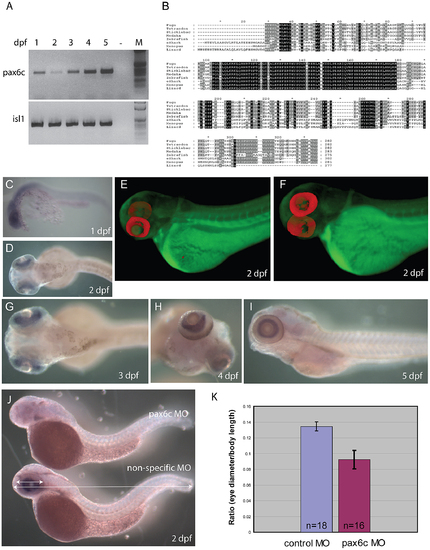|
Characterization of zebrafish Pax6.2a. A) rtPCR for Pax6.2a using cDNA from one to five dpf zebrafish embryos showing expression of the gene at all stages. rtPCR using Islet-1cDNA was used as control. B) Protein alignment of Pax6.2 from multiple species showing homology between the Pax6.2 proteins. Homology is highest in the homeobox but extends to several motifs in the PST domain. Zebrafish Pax6.2a shares highest homology with Pax6.2b proteins from other teleosts. (C–I) RNA in situ hybridisation analysis on fixed zebrafish embryos from 1 dpf to 5 dpf. C) At 24 hpf staining is seen in the head region of embryos. D) By 48 hpf expression has become limited to the developing retinae. E,F) Optical Projection Tomography (OPT) stills reveal the restricted expression of Pax6.2 in the retina where it appears limited to the inner nuclear layer. G–I) Expression in the inner nuclear layer of the retina is maintained at 3 dpf (G), 4 dpf (H) and 5 dpf (I). J) Morpholino depletion of Pax6.2a gives rise to zebrafish embryos with relatively smaller eyes compared to embryos injected with a control morpholino. Embryos were fixed at 2 dpf and tested for the presence of Pax6.2 transcript by in situ hybridization. K) Quantification of eye size reveals a 30% reduction in eye size relative to total body length in Pax6.2a morphants versus control morpholino injected embryos.
|

